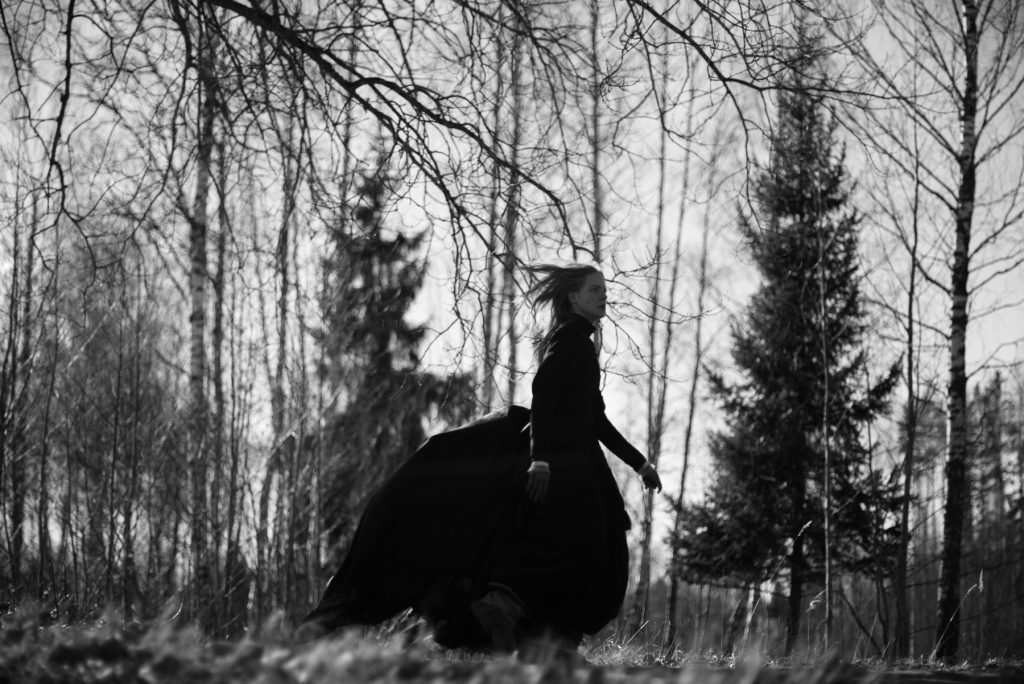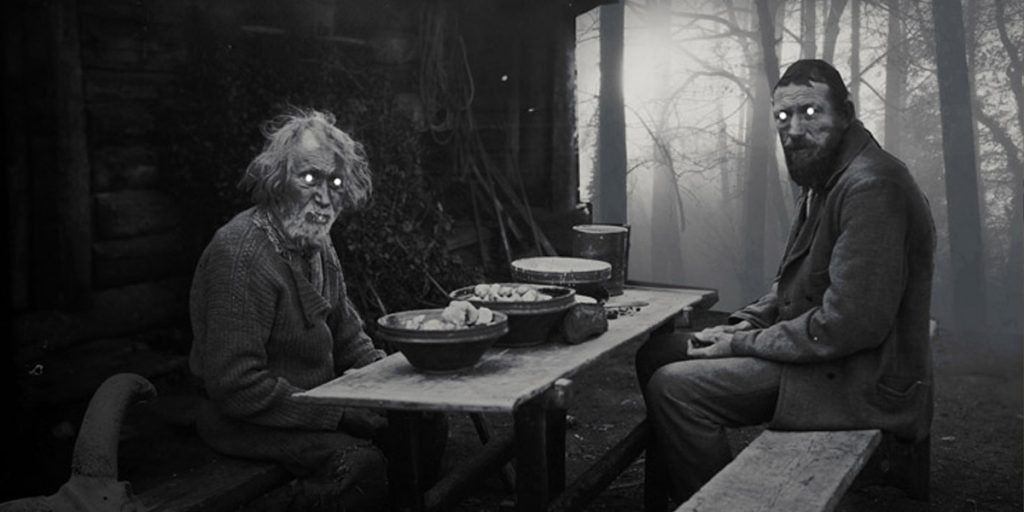November descends into the despairing snowy forests of Estonia to spin a dreamlike tale of folkloric superstition, unrequited love, and exchanges of souls.
Our eyes gaze at the stark beauty of the cold Estonian landscape, tranquil images of reflections of trees across a frozen lake and a wolf playfully rolling through the snow. The calm is broken by the mechanical whirr of a kratt made of three bladed farming tools and a cow skull as it rolls across a field into the frame. The kratt breaks into a farmhouse and drags a reluctant cow into the field and spins its blades to take flight. To our confused yet enraptured eyes, it looks like a macabre helicopter airlifting a cow above the bare winter trees.
Leave behind a familiar reality and descend into Rainier Sarnet’s film November (Rehepaap), a world governed by folkloric logic; the enchanted forests of Estonia where witches and werewolves roam, where ghosts of the dead manifest and return to their homes to eat and visit the sauna, where the devil, sometimes tricked but occasionally preying on the unsuspecting, appears in a flash of lightning at a crossroads and makes cheap exchanges for souls.
Based on Andrus Kivirähk’s 2000 novel Rehepapp ehk November, the film is set between a peasant village and a German baron’s manor in nineteenth century Estonia. Defying her father’s wishes to be married to an older farmer after a drunken bet at a pub, Liina (Rea Lest-Liik) is in love with another peasant, Hans (Jörgen Liik), whose eyes and heart are set on a visiting German baroness (Jette Loona Hermanis). Desperate to capture the affections of their unrequited loves, Liina and Hans turn to superstitious means to realize desires that will never manifest. In between these and other instances of ill-fated love, the peasants struggle for their own survival in a cruel and harrowing world.

Shot in crisp black and white, November is a feast for the eyes. There’s a stark beauty to the film, capturing the meditative tranquility of snowy hills and rivers, as well as the ominous darkness and danger of the forest at night. Particularly stunning is a shot of the baroness sleepwalking on the roof of the manor, with moonlight eerily illuminating the nighttime clouds with gothic precision. Also impressive is the film’s practical effects for the kratts, the puppetry adding rickety and unnatural movement that CGI just wouldn’t be able to capture. Our immersion is furthered into this cinematic world by the film’s superb sound design, like the crackling of a fireplace or the demonic murmurs we hear when the devil appears. Meanwhile, Sarnet’s choice of music is at times idiosyncratic, with cues like Beethoven’s Moonlight Sonata heard in one scene to a foreboding electric guitar in the strange opening sequence.
While surrounded by death and suffering, November surprisingly charms with a wicked, irreverent sense of humor. In one scene where the peasants meet to prepare for a coming plague, a farmer instructs them to “take your pants off and put them on your head. The plague will think we have two asses and won’t dare to touch us.” The film is not above gross body humor either, such as in a scene where a desperate man asks two witches for a love potion and he is told, ““Mix your sweat and armpit hairs with your shit. And that’s your love potion. Feed it to her and she’ll fall for you.” These absurd moments don’t take us out of the film, rather they deeper our immersion inside its setting, adding an earthly dimension that complements the grimy, rustic landscape these characters inhabit. Meanwhile, there is even room for a few tender moments. In one scene, a naïve Hans asks his kratt to steal the baroness, but it refuses as a kratt cannot steal humans. Instead, the kratt shares a story about a past life and offers advice, sharing romantic poems and inspires Hans to create his own poem: “You breathe like a calf. Like a small cow.”
Most beguiling of all is November’s bleak, despairing vision of a hopeless world inhabited by thieving peasants and supernatural beings, a world where a soul is the most valuable possession yet is cheaply sold to the devil in exchange for impulsive desires. The setting is both spiritual and worldly, where beings from higher planes pass through a mortal world, where unlucky souls inhabit farming tools as a kratts to endlessly work for their human masters, where plagues manifest as animal or humanlike beings. Little exposition is given to the ambiguous worldbuilding beyond what we can deduce for ourselves, inviting us to surrender ourselves and not worrying about trying to comprehend the images witnessed. This is a film to enter and experience, and a perfect watch for a dark fall or winter night.
November is available to watch on Vimeo on Demand.

